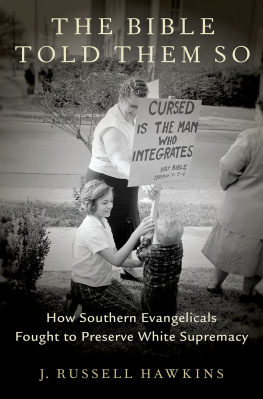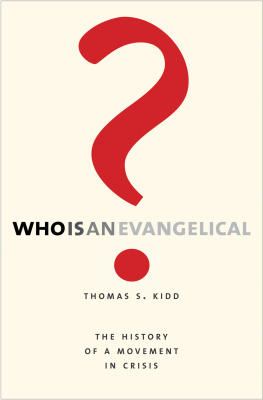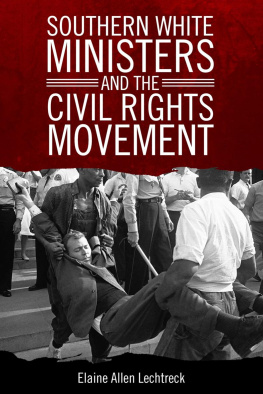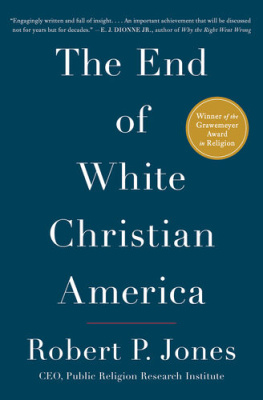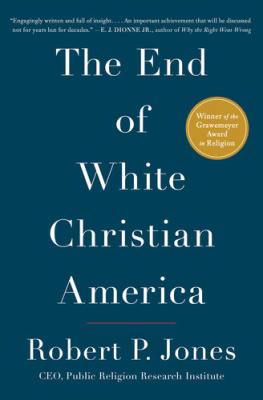The Bible Told Them So

Oxford University Press is a department of the University of Oxford. It furthers the Universitys objective of excellence in research, scholarship, and education by publishing worldwide. Oxford is a registered trade mark of Oxford University Press in the UK and certain other countries.
Published in the United States of America by Oxford University Press
198 Madison Avenue, New York, NY 10016, United States of America.
Oxford University Press 2021
All rights reserved. No part of this publication may be reproduced, stored in a retrieval system, or transmitted, in any form or by any means, without the prior permission in writing of Oxford University Press, or as expressly permitted by law, by license, or under terms agreed with the appropriate reproduction rights organization. Inquiries concerning reproduction outside the scope of the above should be sent to the Rights Department, Oxford University Press, at the address above.
You must not circulate this work in any other form and you must impose this same condition on any acquirer.
Library of Congress Cataloging-in-Publication Data
Names: Hawkins, J. Russell, author.
Title: The Bible told them so : how Southern Evangelicals fought to
preserve white supremacy / by J. Russell Hawkins.
Description: New York, NY : Oxford University Press, [2021] |
Includes bibliographical references and index.
Identifiers: LCCN 2020058623 (print) | LCCN 2020058624 (ebook) |
ISBN 9780197571064 (hardback) | ISBN 9780197571071 (epub)
Subjects: LCSH: South CarolinaChurch history20th century. |
SegregationReligious aspectsChristianity. | Segregation
South CarolinaHistory20th century. | Christians, White
South CarolinaHistory. | White supremacy movementsReligious aspectsChristianity. |
BaptistsSouth Carolina. | MethodistsSouth Carolina. |
RacismReligious aspectsChristianity. | South CarolinaRace relations.
Classification: LCC BR555.S6 H39 2021 (print) |
LCC BR555.S6 (ebook) | DDC 261.709757/09045dc23
LC record available at https://lccn.loc.gov/2020058623
LC ebook record available at https://lccn.loc.gov/2020058624
DOI: 10.1093/oso/9780197571064.001.0001
for Kristi, my love
Contents
I made my first trip to South Carolina to conduct the research that would eventually become this book in 2006. One of the difficulties with a project that spans fourteen years is the accumulation of debts so numerous that they are impossible to fully remember, let alone repay. What follows is a meager attempt to, at a minimum, acknowledge some of those debts. I hope that the people named below recognize their influence on this project far exceeds the brief mention I am able to give them.
Financial support for researching this book came in part from the Southern Baptist Historical Library and Archives, Baylor Universitys Institute for Oral History, the University of South Carolinas Institute for Southern Studies, Rice Universitys Dean Currie Fund, and Indiana Wesleyan Universitys Lilly Scholarship Fund and Sabbatical Grant Award. The generosity of these various entities allowed me to pursue research in nineteen different archives in half a dozen states. While a cursory glance through the notes will reveal that some of those archival visits were more fruitful than others, the archivists at each and every stop were unfailingly helpful and went out of their way to provide me with the materials I knew I needed and point me to more that they knew I needed. Among this group of archivists, Bill Sumners, Graham Duncan, Kate Moore, Herb Hartsook, and Phillip Stone deserve special recognition for sharing their insights, expertise, and camaraderie during my visits to their respective collections.
John B. Boles oversaw this project in its early stages as a graduate dissertation at Rice University and pushed me to extend my arguments and analysis as it evolved into a monograph. Along the way, John has been an unwavering source of encouragement and kindness. Those of us who have been students of Dr. Boles know how fortunate we are to have been recipients of his brilliance and generosity. Michael Emersons scholarship on race and evangelical Christianity also played a significant role in shaping the ideas found in these pages during their nascent stage at Rice and in their final form in this book. Michaels professional and personal advice and guidance over the years have been indispensable to me. Early in my career I was fortunate to participate in a three week interdisciplinary seminar that Michael convened at Calvin University in 2010 on the topic of race in American religion. A decade later, many of the relationships forged during that seminar continue to endure and the arguments in this book have been strengthened by the historians, theologians, and sociologists Michael gathered together that summer: Ed Blum, Tanya Brice, Ryon Cobb, Korie Edwards, Paul Gordiejew, Luke Harlow, Kimberly Hill, Karen Joy Johnson, Rebecca Kim, Mark Mulder, Jerry Park, Julie Park, Regina Shands Stoltzfus, and Erica Wong. Another member of our group, theologian Bruce Fields, passed away before this books publication, but his influence helped shaped not only this book but my own life as well.
It has been a pleasure working with Oxford University Press again, and I am especially grateful for Cynthia Read and Brent Matheny who shepherded this project along. In addition to designing the incredible cover, Oxford also lined up stellar anonymous readers whose helpful suggestions and trenchant critiques made for a much better final product.
As helpful as the anonymous readers were, so too have been the innumerable colleagues and peers who have provided invaluable feedback at different points in the writing of this book. Three deserve special mention. Carolyn Dupont has been generous with her analysis of my work in its various stages and the insights drawn from her research of Mississippi evangelicals helped sharpen my own conclusions. In addition to commenting on chapter drafts, Wes Phelps has served as my roommate at many academic conferences over the years where he has endured a decades worth of discussions about this book and its arguments. Finally, Luke Harlow has read drafts of seemingly everything I have written going back to our earliest days together as new graduate students at Rice and has never failed to provide suggestions that improve my analysis and arguments at every turn. Carolyn, Wes, and Luke have all made this a significantly better book.
My academic home the past twelve years has been in the John Wesley Honors College at Indiana Wesleyan University. My honors college colleagues have been the best I could have wanted and I have lost track of the number of drafts I have asked them to read or conversations about race and evangelicalism I have subjected them to. These fine individuals include Annastasia Bonczyk, Brian Clark, Lena Crouso, Lanta Davis, Lexi Eikelboom, Kirsten Guidero, Amy Peeler, Lance Peeler, Todd Ream, Jason Runyan, Jeff Tabone, Sara Scheuneman, Anneke Stasson, Julia VanderMolen, Lisa Toland Williams, and Sameer Yadav. It has been a gift to be part of this interdisciplinary community where my own research has been pushed and deepened by the insights and scholarship of these incredible peers. Two additional honors college colleagues warrant further recognition. David Riggs has been my dean since the day I arrived at Indiana Wesleyan and has been nothing but supportive of my research and teaching from the start. I am thankful for both his professional leadership and personal friendship. I had the good fortune of having an office across the hall from Charles Bressler for my first seven years at Indiana Wesleyan and learned how to teach and interact with students and colleagues by following his example. Charles read every single word of this book in its manuscript form. And after I incorporated his feedback, he read every word again. With his keen editorial eye, Charles improved this book immensely. Thank you, kind sir!

